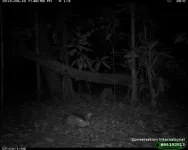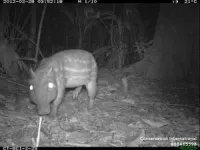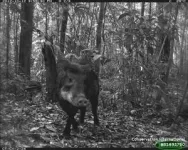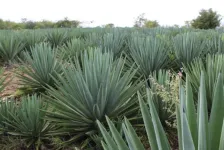(Press-News.org) A recent study using automatic wildlife cameras across three continents has shed light on how the moon's phases affect the behaviour of tropical forest mammals. Half of the species studied altered their activity levels or timing, or both, in response to the full moon. The findings suggest that even in some of the darkest places on earth - the floors of tropical forests - the moon's phases can influence animal behaviour. This impact could be even more pronounced in degraded and fragmented forests.
“Imagine playing hide-and-seek in a dark room, and then somebody lights a candle,” says Richard Bischof, professor at the Norwegian University of Life Sciences (NMBU).
“The light, even if it is weak, may make it easier for you to find your way around the room.”
“But if you are the one hiding, you suddenly become a lot easier to detect.”
In the same way, extra light changes the conditions for predators and their prey inhabiting tropical forests. But the stakes are much higher.
Half of the species had a reaction
In the study, an international team of researchers have analysed 2.1 million images from wildlife cameras from 17 protected forests on three continents. The wildlife images are collected by the Tropical Ecology Assessment and Monitoring Network.
In total, 86 mammal species were recorded. Twelve species displayed strong avoidance of moonlight during night, while only 3 species exhibited a strong attraction to moonlight.
“These were the species with the most pronounced reactions,” Bischof explains.
“However, half of all the species responded to lunar phases. Either by changing their nocturnal habits, altering their overall activity levels, or both.”
Avoidance of the full moon was more common, exhibited by 30% of all species, compared to 20% of species that showed attraction. Nocturnal species, especially rodents, were over-represented among species that avoided the full moon.
What is the problem?
But surely moonlight is a natural phenomenon? Why should we worry about how animals respond to it?
“The key takeaway from our research is that light affects animal behaviour,” Bischof says.
“It raises further questions about how changes in illumination affect species activity.”
Other conditions that increase light levels at forest floors include changes in canopy cover due to logging, and artificial illumination, such as road lights and buildings.
Tropical forests, which harbour a substantial portion of earth’s biological diversity, are being cleared, fragmented, and degraded at an alarming rate. This not only results in direct habitat loss and modification but also in reduced canopy cover.
“Areas affected by artificial illumination due to urbanisation also continue to increase.”
More light – less activity
Despite humanity’s massive impact on the globe, we still know remarkably little about the
implications of illumination on the activity of most mammals.
The higher prevalence of avoidance of the moon in the study suggests there may be more losers than winners when illumination increases in tropical forests.
Moreover, almost all species that responded negatively to moonlight did so at least in part by reducing their overall activity during periods with full moon.
“If these results extend to artificial light, loss of dark nights could curtail the amount of time animals invest into foraging and other important activities,” Bischof comments.
“There is a risk that we are fundamentally altering both species composition and species interactions in tropical forest communities through light conditions alone.”
The influence of natural and artificial light raises important questions and concerns in wildlife conservation and ecosystem functioning.
Halloween is just around the corner; and as it turns out, the moon's influence extends beyond spooky tales and into the dark midst of our tropical forests. Recognising this can help us shape more effective conservation strategies for the future.
END
Beware of the full moon: Tropical forest mammals shy away from the moonlight
Half of the mammal species in tropical forests adjust their behaviours in response to the moon's phases.
2024-10-16
ELSE PRESS RELEASES FROM THIS DATE:
Energy-thirsty indoor vertical gardens ripe for improvement
2024-10-16
Indoor vertical gardens are gaining popularity among homeowners and restaurants, allowing them to grow microgreens year-round, but new research has identified a major drawback: their demands on energy.
A study by researchers from the Marche Polytechnic University and University of South Australia shows that while domestic vertical garden appliances can provide fresh, local produce under controlled conditions and with zero food miles, they do chew up energy.
Artificial lighting – essential for plant growth – accounted for more than 50% of the total energy costs in growing a crop of red lettuce, which is five times higher than professional ...
Around 40% of postmenopausal hormone positive breast cancers linked to excess body fat
2024-10-15
Around 40% of postmenopausal hormone positive breast cancer cases may be linked to excess body fat, suggests Spanish research published online in the Journal of Epidemiology & Community Health.
This proportion is significantly higher than 1 in 10 such cases currently attributed to excess weight, using the widely used measure of body mass index (BMI), and indicates that the real impact of obesity on breast cancer risk has likely been underestimated, say the researchers.
BMI isn’t necessarily a very accurate measure of body fat, particularly in older women, because it doesn’t account for age, sex, or ethnicity, they point out.
They therefore ...
No evidence for belief that nut allergens spread through aircraft ventilation systems
2024-10-15
There is no evidence for the commonly held belief that nut allergens can be spread through aircraft ventilation systems, say allergy and aviation medicine specialists in an evidence review published in the Archives of Disease in Childhood.
Allergen residues on surfaces, such as tray tables, and seat-back video screens, pose the main risk—a risk that is likely heightened by the fast turnaround times deployed by many low-cost carriers, they suggest.
And allergic reactions to foods are around 10 to 100 times less common during flights than they are ‘on the ground,’ they point out, although this could be due to passengers with food allergies ...
First study to show high potency cannabis use leaves unique signature on DNA
2024-10-15
Published in Molecular Psychiatry, this is the first study to suggest that the use of high potency cannabis leaves a distinct mark on DNA, providing valuable insights into the biological impact of cannabis use. High potency cannabis is defined as having Delta-9-tetrahydrocannabinol (THC) content of 10 per cent or more.
The research also showed the effect of cannabis use on DNA is different in people experiencing their first episode of psychosis compared to users who have never experienced psychosis, ...
Out-of-this-world simulation key to collecting moon dust
2024-10-15
Teleoperated robots for gathering moon dust are a step closer, according to new research by scientists at the University of Bristol.
The team were able to complete a sample collection task by controlling a virtual simulation, which then sent commands to a physical robot to mirror the simulation’s actions. They were able to do so while only monitoring the simulation - without needing physical camera streams - meaning this tool could be particularly useful for delayed teleoperation on the Moon.
Alongside a boom in lunar lander missions ...
UCL engineers set new record on how fast data can be sent wirelessly
2024-10-15
A new world record in wireless transmission, promising faster and more reliable wireless communications, has been set by researchers from UCL.
The team successfully sent data over the air at a speed of 938 Gigabits per second (Gb/s) over a record frequency range of 5-150 Gigahertz (GHz).
This speed is up to 9,380 times faster than the best average 5G download speed in the UK, which is currently 100 Megabits per second (Mb/s) or over1. The total bandwidth of 145GHz is more than five times higher than the previous wireless transmission world record.
Typically, wireless networks transmit information using radio waves over ...
Isolated older people more likely to have low levels of key nutrients in their diet
2024-10-15
Older adults in the UK who are socially isolated are more likely to have an insufficient intake of key micronutrients such as vitamin C and vitamin B6, increasing their risk of health problems, according to a new study led by UCL (University College London) researchers.
The study, published in the journal Age and Ageing, looked at data from 3,713 people in the UK aged 50 and over who filled in a detailed questionnaire about what they ate and drank on two separate days.
The researchers found that people who were more socially isolated were more likely to have a lower than recommended intake of five micronutrients ...
Brazilian researchers work to transform agave into the ‘sugarcane of the sertão’
2024-10-15
Climate change has caused an increase in the semi-arid climate region in Brazil. Data from the National Center for Monitoring and Warning of Natural Disasters (CEMADEN) and the National Institute of Space Research (INPE) in the South American country indicate an expansion of 7,500 square kilometers per year since 1990, which is equivalent to five times the area of the city of São Paulo. A similar phenomenon has been observed in some regions of Europe and North Africa.
With this in mind, and with the desire to find solutions to mitigate climate change, a group ...
Seizures caused by children swallowing medications or illegal substances doubled over 15-year period
2024-10-15
Copenhagen, Denmark: New data shows that the number of children suffering a seizure after swallowing medications or illegal substances has doubled between 2009 and 2023 in the US. The findings were presented today (Wednesday) at the European Emergency Medicine Congress.
The most common substances involved in these poisonings include over-the-counter antihistamines, prescription antidepressants and painkillers, and illegal synthetic cannabinoids.
Dr Conner McDonald from the University of Virginia School of Medicine told the Congress: “Seizure is one of the most severe symptoms a poisoned ...
Increase in air pollution corresponds with more patients at the hospital emergency department
2024-10-15
Copenhagen, Denmark: Increases in levels of particulate matter in the air, even within World Health Organization guidelines, correspond with an increase in the number of patients going to the hospital emergency department, according to research presented at the European Emergency Medicine Congress today (Wednesday).
The study found links particularly between air pollution and cases of trauma, breathing difficulties and skin conditions.
The research was presented by Dr Andrea Rossetto an emergency medicine resident at University of Florence and Careggi University Hospital, Florence, Italy, and a PhD Student at Queen Mary University of London, UK.
Dr ...
LAST 30 PRESS RELEASES:
New strategies boost effectiveness of CAR-NK therapy against cancer
Study: Adolescent cannabis use linked to doubling risk of psychotic and bipolar disorders
Invisible harms: drug-related deaths spike after hurricanes and tropical storms
Adolescent cannabis use and risk of psychotic, bipolar, depressive, and anxiety disorders
Anxiety, depression, and care barriers in adults with intellectual and developmental disabilities
Study: Anxiety, gloom often accompany intellectual deficits
Massage Therapy Foundation awards $300,000 research grant to the University of Denver
Gastrointestinal toxicity linked to targeted cancer therapies in the United States
Countdown to the Bial Award in Biomedicine 2025
Blood marker from dementia research could help track aging across the animal world
Birds change altitude to survive epic journeys across deserts and seas
Here's why you need a backup for the map on your phone
ACS Central Science | Researchers from Insilico Medicine and Lilly publish foundational vision for fully autonomous “Prompt-to-Drug” pharmaceutical R&D
Increasing the number of coronary interventions in patients with acute myocardial infarction does not appear to reduce death rates
Tackling uplift resistance in tall infrastructures sustainably
Novel wireless origami-inspired smart cushioning device for safer logistics
Hidden genetic mismatch, which triples the risk of a life-threatening immune attack after cord blood transplantation
Physical function is a crucial predictor of survival after heart failure
Striking genomic architecture discovered in embryonic reproductive cells before they start developing into sperm and eggs
Screening improves early detection of colorectal cancer
New data on spontaneous coronary artery dissection (SCAD) – a common cause of heart attacks in younger women
How root growth is stimulated by nitrate: Researchers decipher signalling chain
Scientists reveal our best- and worst-case scenarios for a warming Antarctica
Cleaner fish show intelligence typical of mammals
AABNet and partners launch landmark guide on the conservation of African livestock genetic resources and sustainable breeding strategies
Produce hydrogen and oxygen simultaneously from a single atom! Achieve carbon neutrality with an 'All-in-one' single-atom water electrolysis catalyst
Sleep loss linked to higher atrial fibrillation risk in working-age adults
Visible light-driven deracemization of α-aryl ketones synergistically catalyzed by thiophenols and chiral phosphoric acid
Most AI bots lack basic safety disclosures, study finds
How competitive gaming on discord fosters social connections
[Press-News.org] Beware of the full moon: Tropical forest mammals shy away from the moonlightHalf of the mammal species in tropical forests adjust their behaviours in response to the moon's phases.




